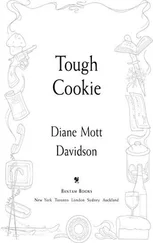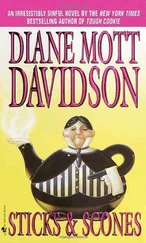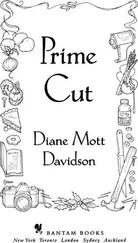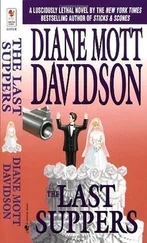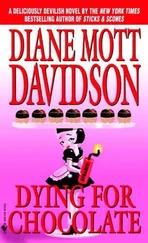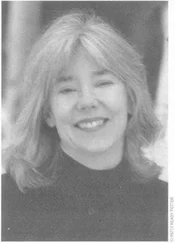Frances, disappointed, hoisted up a box and tottered on the sling-back shoes. “Did that girl flunk verbal skills, or what? Do saleswomen talk just about what they sell?” Now it was my turn to feign ignorance. She went on: “I really shouldn’t help you, Goldy, but I need a cigarette. The anti-smoking cops in this mall will throw me in handcuffs if I light up anywhere but in the garage. You blew my cover. I can’t walk in these damn heels. And I’m going to wreck this frigging expensive dress if I carry this box anywhere. A couple of your brownies aren’t worth the aggravation—”
“Sorry about that, Frances,” I interrupted. “You are such a dear. Not only that, but you’re the only person I know who uses the phrase ‘blew my cover.’ And anyway, I’ll bet you got the paper to pay for your outfit and your lunch. What did you tell the Mignon cosmetics people, that you were from Cosmopolitan?”
“Vogue.”
“Fabulous.”
We lifted our boxes and walked out to the garage. The temperature had risen. Heat seemed to shimmer above the pavement. Three hours had passed since the accident, and everything appeared back to normal. There was no sign of either the demonstrators or the police. In another attempt at nonchalance, Frances glanced furtively in all directions. If she thought I was going to tell her anything about the day’s tragic events, she was very mistaken.
“How’s married life treating you?” she asked mildly after she’d pushed her box into my van. I noticed someone had inexpertly applied bright red polish to her stubby, much-gnawed fingernails. Part of her cover, no doubt.
“Just great,” I told her.
Frances nodded without interest and unceremoniously unzipped her dress from the collar to the chest and pulled a squashed pack of cigarettes out of her bra. She leaned against the van, lit up, and inhaled greedily, then grinned at me as she blew out smoke rings. I asked, “So how do you cover demonstrators outside a building from inside, when you’re at a banquet? And why were you asking about security? The security guys were all out here.”
“Oh, they were, were they?”
“Frances, don’t jive me.”
“And you, Goldy, are the only one I know who’d use the phrase ‘don’t jive me.’” She drew lavishly on the cigarette. “That department store has a lot of problems,” she said with an arched eyebrow. She blew out smoke, stuck the cigarette back between her lips, and used both hands to rezip her dress. “Or haven’t you heard?” When I shook my head, she shrugged. “I’ve heard some rumors. You know, got to follow everything up, check everything out. Let’s just say I thought the cosmetics place was a good place to start.”
I decided to ponder that in silence.
When she’d finished her smoke we walked back to the nightclub, picked up the last batch of boxes, and took them to the van. We chatted about the heat and how we would never in a million years spend the money Mignon was asking for all that night cream, day cream, outside—and inside—and in-between cream. Once the boxes were stacked and secured, I hopped behind the steering wheel, turned on the motor, and thanked Frances again for helping me. As I drove away, I watched her oddly stylish silhouette in my rearview mirror. Just checking out rumors, my feijoada. A new dress, high-heeled shoes, nail polish, and no cigarette for two hours of banquet and presentation? Lucky for me, I knew when she was jiving me.
Sometimes I think my van returns to Aspen Meadow by rote. And it’s a good thing too, since I was in no shape to be analytical about anything, least of all driving. I rolled down the windows and filled my lungs with hot air. It wasn’t much of a relief after the putrid-smelling warmth of the mall garage. Heat shuddered off the windows and pressed down on the van’s roof. My elbow burned the second I accidentally rested it on the fiery chrome. When I started out in the catering business, most of my jobs had been in Aspen Meadow. So of course I hadn’t bothered to get air-conditioning in my vehicle. Occasionally, like today, I regretted making that small saving.
The van wheezed up westbound Interstate 70 and soon the sultry wind flooding the car cooled. Thirty minutes later I pulled over to take a few deep breaths under a pylon of what Aspen Meadow folks call the Ooh-Ah Bridge, nicknamed for its spectacular panoramic view of the Continental Divide. A small herd of buffalo grazed in a fenced meadow near the bridge. I stared dejectedly at them and felt a fresh surge of remorse. Why hadn’t I accompanied Claire to her vehicle? Why hadn’t I insisted Julian go with her? No, that wouldn’t have been a good idea. In his lovestruck state of mind, Julian could have been hit as well. But a contingent of the sheriff’s department had been stationed nearby. Why hadn’t I insisted a policeman walk with Claire? Why?
Afternoon clouds billowed above the horizon like mutant cauliflower. Below them, the sweep of mountains were deeply shadowed in purple. My ears started to buzz. Tom would be calling . Three dark, stolid-looking buffalo eyed me, blinked, and then shuffled away. I had a sudden memory of Julian reeling out of control as his eyes fluttered shut. Julian was in shock. Next to the road, delicate bluebell blossoms bent in the mountain breeze. Claire, lovely violet-eyed Claire, was dead .
I drove home. I needed to be in my own place, needed a cold beverage, needed most of all to reconnect with my family and friends. When I came through the back door, the place felt empty and unusually stuffy. Irritation snaked up my spine. Because of the security system I’d been forced to install to keep my periodically violent ex-husband at bay, the windows stayed shut—and therefore wired—in my absence. I’d been tempted to disable the system once I was married to a formidable, gun-toting policeman. But Tom promptly vetoed that idea. You never know when he might turn up , he warned. I can’t always be around . But it was okay now, I’d protested. The Jerk wouldn’t dare bother me with a policeman in residence. Although he was ridiculously vain about being a doctor, my ex-husband was basically a coward. You haven’t seen ex-husband jealousy the way I’ve seen it , Tom replied flatly. Believe me, you don’t want to was the unspoken end of that warning.
Anyway, I’d given up trying to convince Tom to let me disable the system about two weeks after we were married this spring. Back then, during a typically frigid and snowy April in Aspen Meadow, I hadn’t thought we’d have a summer with record-shattering heat. But now it was July, and June had been the hottest since the state started keeping weather statistics in the late 1800s. Coming into the old house when it had been clamped up tight in our absence, I felt like Gretel being forced into the oven by the witch.
I opened the windows downstairs, then threw the upstairs windows open and allowed the afternoon breeze off Aspen Meadow Lake, a half-mile away, to drift in. Combined with the lilting notes of jazz saxophone coming from down the street the fresh air felt heavenly. The music came from the Routts’ place. Dusty’s grandfather played the instrument to placate Dusty’s little brother, Colin, who was born prematurely at the beginning of April, before the Habitat house had been finished. Dusty’s mother hadn’t done too well hanging on to men; I’d heard both Dusty’s father and the father of the infant had taken hikes.
Mesmerized by the music, I crossed to the windows looking out on the street and gazed at the Routts’ place. To build the dwelling, the local Habitat for Humanity had relied on funds and workers from our parish, St. Luke’s Episcopal Church. The house was a simple two-story affair with inexpensive wood paneling, a tiny deck, and a room with jalousie windows off the right side. Church workers had repeatedly graded the driveway during Aspen Meadow’s muddy spring. The yard was covered with freshly excavated dirt. Red clay over the septic tank was as raw as a wound. Along the sidewalk, a stand of purple fireweed had somehow survived the construction. Unlike several of our neighbors, I’d welcomed the Routts, even if they were poor. I’d enjoyed being the church person assigned with coordinating two weeks of dinners sent in during the move and unpacking. Although I’d never met the grandfather, Dusty and her mother, Sally, had been profoundly thankful. I liked them. And at the moment I was even jealous of them: The saxophone music was coming out of open windows, something I could have only when I was home.
Читать дальше



